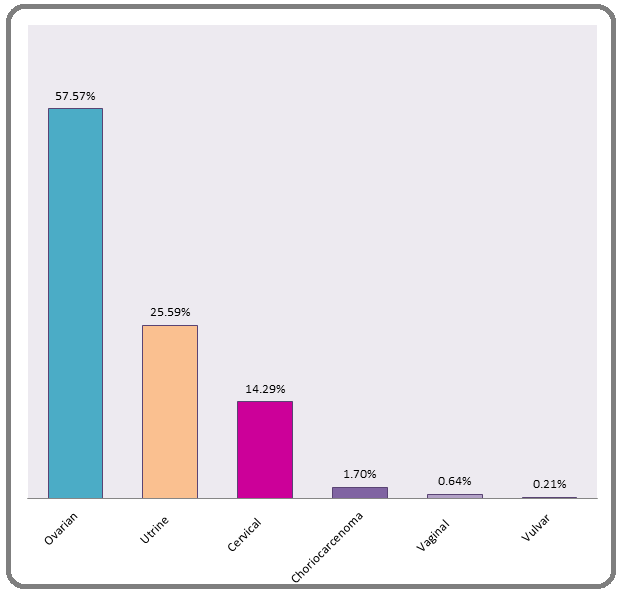Gynecological Cancer in Middle Euphrates Region of Iraq , 2012-2020
Download
Abstract
short communication
Approximately 1.3 million new cases of gynecological malignancy are diagnosed yearly [1]. More than one quarter of newly diagnosed cancer cases in women are gynecological cancer. There are many risk factors such as human papilloma virus (HPV) infections, smoking, increased body weight, and long-term use of birth control pills [2-3].
Here we investigated gynecological cancer distribution in Al-Hussein cancer center in Karbala province of Iraq from 2012 to 2020. This center was established in November 2011 with oncology & hematology wards while health authorities in Karbala are planning for establishing radiotherapy department in future. This centre covers not only Karbala population but other patients from Middle Euphrates region in Iraq are referred to this center for solid & hematological malignancy treatment [4]. There were 469 cases of gynecological cancer registered in our center, ovarian cancer was the most common with 270 patients (57.57 %) followed by uterine cancer 120 patients (25.59%), cervical cancer 67 patients (14.29%), choriocarcinomas 8 patients (1.70%), vaginal cancer 3 patients (0.64%) and vulvar cancer 1 patients (0.21%) as shown in (Figure 1) .
Figure 1: Incidence Rate of Gynecological Cancer Types.

Mean age was 49.81 years , age range (2-95) years. Patients above 40 years old represent the majority of cases (72.29%). While those ≤ 20 years only (13.22%) as shown in (Table 1).
| Age groups | Ovarian | Uterine | Cervical | Choriocarcinomas | Vaginal | Vulvar | Total |
| N (%) | N (%) | N (%) | N (%) | N (%) | N (%) | N (%) | |
| 0-10 | 37 (13.70%) | 0 (0.00%) | 0 (0.00%) | 0 (0.00%) | 0 (0.00%) | 0 (0.00%) | 37 (7.89%) |
| 11-20 | 21 (7.78%) | 1 (0.83%) | 0 (0.00%) | 3 (37.50%) | 0 (0.00%) | 0 (0.00%) | 25 (5.33%) |
| 21-30 | 16 (5.93%) | 0 (0.00%) | 0 (0.00%) | 5 (62.50%) | 2 (66.67%) | 0 (0.00%) | 23 (4.90%) |
| 31-40 | 31 (11.48) | 9 (7.50%) | 5 (7.46%) | 0 (0.00%) | 0 (0.00%) | 0 (0.00%) | 45 (9.59%) |
| 41-50 | 56 (20.74%) | 30 (25.00%) | 27 (40.30 %) | 0 (0.00%) | 1 (33.33%) | 0 (0.00%) | 114 (24.31%) |
| 51-60 | 55 (20.37%) | 41 (34.17%) | 19 (28.36%) | 0 (0.00%) | 0 (0.00%) | 0 (0.00%) | 115 (24.52%) |
| 61-70 | 41 (15.19%) | 31 (25.84%) | 12 (17.91%) | 0 (0.00%) | 0 (0.00%) | 0 (0.00%) | 84 (17.91%) |
| 71-80 | 11 (4.07%) | 6 (5.00%) | 4 (5.97%) | 0 (0.00%) | 0 (0.00%) | 0 (0.00%) | 21 (4.48%) |
| 81-90 | 1 (0.37%) | 1 (0.83%) | 0 (0.00%) | 0 (0.00%) | 0 (0.00%) | 1 (100%) | 3 (0.64%) |
| 91-100 | 1 (0.37%) | 1 (0.83%) | 0 (0.00%) | 0 (0.00%) | 0 (0.00%) | 0 (0.00%) | 2 (0. 43%) |
| Total | 270 (100%) | 120 (100%) | 67 (100%) | 8 (100%) | 3 (100%) | 1 (100%) | 469 (100%) |
Our study may help to provide basic information about gynecological cancer to assess progress in recent years and to develop future cancer treatment strategies.
Conflicts of interest
There are no conflicts of interest .
References
- Global cancer statistics 2018: GLOBOCAN estimates of incidence and mortality worldwide for 36 cancers in 185 countries Bray Freddie, Ferlay Jacques, Soerjomataram Isabelle, Siegel Rebecca L., Torre Lindsey A., Jemal Ahmedin. CA: A Cancer Journal for Clinicians.2018;68(6). CrossRef
- Gynecological cancer update Sekhon R, Bhatla N. Asian J Oncol.2016;2(02):061-062.
- Association of Obesity and Cancer Risk in Canada Pan S. Y.. American Journal of Epidemiology.2004;159(3). CrossRef
- Leukemia Epidemiology in Karbala province of Iraq Mjali Ahmed, Hasan Jaleel Al-Shammari Haider, Tawfeeq Abbas Nareen, Deheyaa Azeez Zahraa, Khudhair Abbas Saja. Asian Pacific Journal of Cancer Care.2019;4(4). CrossRef
Author Details
How to Cite
- Abstract viewed - 0 times
- PDF (FULL TEXT) downloaded - 0 times
- XML downloaded - 0 times